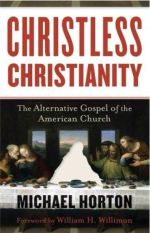Session #1: The Front Page God (MP3)
Session #2: The Promise-Driven Life (MP3)
Session #3: Feasting in a Fast Food World (MP3)
Session #4: Question and Answer (MP3)
Taken from: http://www.monergism.com/thethreshold/articles/onsite/gospeldriven.html

 Here we are in the North American church—conservative or liberal, evangelical or mainline, Protestant or Catholic, emergent or otherwise—cranking along just fine, thank you. So we’re busy downsizing, becoming culturally relevant, reaching out, drawing in, making disciples, managing the machinery, utilizing biblical principles, celebrating recovery, user-friendly, techno savvy, finding the purposeful life, practicing peace with justice, utilizing spiritual disciplines, growing in self-esteem, reinventing ourselves as effective ecclesiastical entrepreneurs, and, in general, feeling ever so much better about our achievements.
Here we are in the North American church—conservative or liberal, evangelical or mainline, Protestant or Catholic, emergent or otherwise—cranking along just fine, thank you. So we’re busy downsizing, becoming culturally relevant, reaching out, drawing in, making disciples, managing the machinery, utilizing biblical principles, celebrating recovery, user-friendly, techno savvy, finding the purposeful life, practicing peace with justice, utilizing spiritual disciplines, growing in self-esteem, reinventing ourselves as effective ecclesiastical entrepreneurs, and, in general, feeling ever so much better about our achievements.
Notice anything missing in this pretty picture? Jesus Christ!
 Something is starting to boil. It has been simmering for a while, kind of quietly on the back burner, but it seems the critiques have really escalated in the past few weeks and been brought to the forefront ever since Time Magazine published their 10 Ideas Changing the World Right Now in which the “New Calvinism” was named Idea # 3. The article mentions Mark Driscoll as one of the key players, in addition to John Piper and Albert Mohler who have done a significant amount of work in bringing a resurgence of Reformed theology and thinking to the church, particularly to my generation. But, what has also fueled the debate that has now been brought to the fore in the Reformed world is that Driscoll has been in several TV interviews and debates (and even hosted one at Mars Hill Church in Seattle recently) on various major TV shows (particularly on ABC), in which it is implied he is the face of this New Calvinism in the media (at least that’s what I’ve gathered). In addition, Matt Chandler was a featured speaker at the 2009 Desiring God Pastors Conference which has really brought the Acts 29 Network into focus within many Reformed camps.
Something is starting to boil. It has been simmering for a while, kind of quietly on the back burner, but it seems the critiques have really escalated in the past few weeks and been brought to the forefront ever since Time Magazine published their 10 Ideas Changing the World Right Now in which the “New Calvinism” was named Idea # 3. The article mentions Mark Driscoll as one of the key players, in addition to John Piper and Albert Mohler who have done a significant amount of work in bringing a resurgence of Reformed theology and thinking to the church, particularly to my generation. But, what has also fueled the debate that has now been brought to the fore in the Reformed world is that Driscoll has been in several TV interviews and debates (and even hosted one at Mars Hill Church in Seattle recently) on various major TV shows (particularly on ABC), in which it is implied he is the face of this New Calvinism in the media (at least that’s what I’ve gathered). In addition, Matt Chandler was a featured speaker at the 2009 Desiring God Pastors Conference which has really brought the Acts 29 Network into focus within many Reformed camps.
 This is a “prophetic” word from Calvin out of the Institutes related to the postmodern sensibilities of Western Christianity. I’m not implying Calvin was speaking directly against postmodernism itself as a formal philosophy, as it had not yet been articulated, but this certainly does speak against its core tenets asserted today, to be sure. And I would say that ultimately, postmodernism, within the setting of Christianity, leaves a person without certainty that they will be accepted before God, which is exactly what Calvin explains in this section. The reason for this is because if you have no certainty and a house built on solid rock, ultimately, you will try and pick up the slack of uncertainty through your own deeds, works and effort in order to please God, which oddly enough, is what we see happening with many (though not all) postmoderns in the focus of various ministry focal points (i.e. deeds versus creeds).
This is a “prophetic” word from Calvin out of the Institutes related to the postmodern sensibilities of Western Christianity. I’m not implying Calvin was speaking directly against postmodernism itself as a formal philosophy, as it had not yet been articulated, but this certainly does speak against its core tenets asserted today, to be sure. And I would say that ultimately, postmodernism, within the setting of Christianity, leaves a person without certainty that they will be accepted before God, which is exactly what Calvin explains in this section. The reason for this is because if you have no certainty and a house built on solid rock, ultimately, you will try and pick up the slack of uncertainty through your own deeds, works and effort in order to please God, which oddly enough, is what we see happening with many (though not all) postmoderns in the focus of various ministry focal points (i.e. deeds versus creeds).
Visit msnbc.com for Breaking News, World News, and News about the Economy
 I want to quote people anonymously from The Shack Facebook group and add some commentary to each to show that this book is not viewed as a mere work of fiction. I believe these quotes are very instructive as to what the book is actually doing in culture and how it is indeed changing people’s understanding of who God is and how He relates to us. It seems many people’s understanding is actually changing based on Young’s understanding and portrayal of God.
I want to quote people anonymously from The Shack Facebook group and add some commentary to each to show that this book is not viewed as a mere work of fiction. I believe these quotes are very instructive as to what the book is actually doing in culture and how it is indeed changing people’s understanding of who God is and how He relates to us. It seems many people’s understanding is actually changing based on Young’s understanding and portrayal of God.
Emotional responses aside to the story itself (not critiquing that at all), if it is an unbiblical portrayal of God and His work to save us in Christ, is that really and truly a good thing? Is that true spiritual progress in terms the Bible prescribes? If people become more religious and emotionally struck as a result, is that necessarily conversion by the Gospel work of Christ, or is it merely becoming religious and “dead in trespasses and sins?” I’m not talking in any way about the story’s plot line being good or not and loving the story in itself and/or identifying with it to some degree. I’m asking, is an unbiblical picture of God a positive thing? What do you think?
Powered by WordPress & Theme by Anders Norén